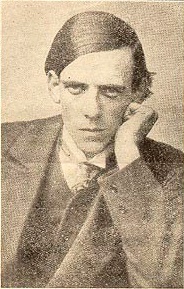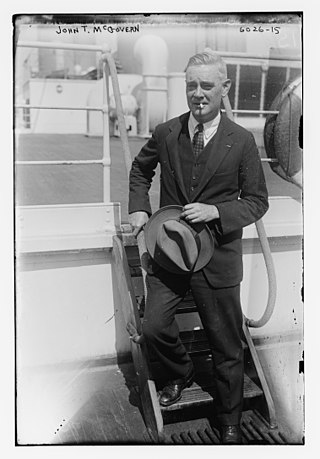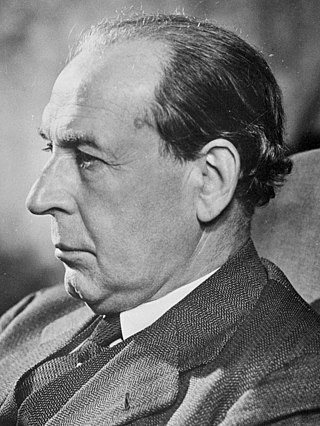Related Research Articles

The Independent Labour Party (ILP) was a British political party of the left, established in 1893 at a conference in Bradford, after local and national dissatisfaction with the Liberals' apparent reluctance to endorse working-class candidates, representing the interests of the majority. A sitting independent MP and prominent union organiser, Keir Hardie, became its first chairman.

James Maxton was a British left-wing politician, and leader of the Independent Labour Party. He was a pacifist who opposed both world wars. A prominent proponent of Home Rule for Scotland, he is remembered as one of the leading figures of the Red Clydeside era. He broke with Ramsay MacDonald and the second minority Labour government, and became one of its most bitter critics. As the leader of the Independent Labour Party (ILP), he disaffiliated the ILP from the mainstream party in 1932. Afterwards, he became an independent dissident outside front-line politics.
Glasgow Bridgeton was a parliamentary constituency in the city of Glasgow. From 1885 to 1974, it returned one Member of Parliament (MP) to the House of Commons of the Parliament of the United Kingdom, elected by the first-past-the-post voting system.
James Carmichael was a Scottish Labour politician.

The Glasgow Camlachie by-election was held on Wednesday 28 January 1948, following the death of the sitting Member of Parliament, Campbell Stephen.

John McGovern was a Scottish socialist politician.
Annie Drummond Maxton was a Scottish socialist politician and trade unionist.
The 1929 Kilmarnock by-election was a by-election held on 27 September 1929 for the British House of Commons constituency of Kilmarnock in Ayrshire.
The 1940 East Renfrewshire by-election was a parliamentary by-election held on 9 May 1940 for the British House of Commons constituency of East Renfrewshire in Scotland.

The 1938 Combined Scottish Universities by-election was a by-election held from 21 to 25 February 1938 for the Combined Scottish Universities, a university constituency of the British House of Commons.

The 1936 Combined Scottish Universities by-election was a by-election held from 27 to 31 January 1936 for the Combined Scottish Universities, a university constituency of the British House of Commons.
The 1946 Combined Scottish Universities by-election was a by-election held from 22 to 27 November 1946 for the Combined Scottish Universities, a university constituency of the British House of Commons.
The 1933 Kilmarnock by-election was a by-election held on 2 November 1933 for the House of Commons constituency of Kilmarnock in Ayrshire.

A general election was held in the United Kingdom on 6 May 2010 and all 59 seats in Scotland were contested. The election result in Scotland was unusual in that there wasn't any change of seats from the 2005 general election, although the Labour Party took back two seats that it had lost in by-elections. This was the most recent general election at which the Labour Party won a majority of seats and plurality of votes in Scotland.
George Stone (1907–2001) was a British socialist journalist.
The Argyll by-election of 12 June 1958 was held after the death of Conservative Party MP Duncan McCallum.
The Glasgow Tradeston by-election was a Parliamentary by-election held on 6 July 1911. It returned one Member of Parliament (MP) to the House of Commons of the Parliament of the United Kingdom, elected by the first past the post voting system.
The Popular Front in the United Kingdom attempted an alliance between political parties and individuals of the left and centre-left in the late 1930s to come together to challenge the appeasement policies of the National Government led by Neville Chamberlain.

The 1933 Glasgow Corporation elections were held on 7 November 1933. The results were devastating for the Moderates, who lost control of the Corporation to Labour for the first time, despite socialist candidates making gains in Glasgow at successive general elections. Labour’s victory came as a surprise, even to the party itself, which had already begun blaming its anticipated defeat on vote-splitting caused by the presence of the ILP & the Communists. Labour's dominance of the Corporation would continue, nearly unbroken, to the present day.
Samuel P. McLaren was a Scottish trade unionist and political activist.
References
- ↑ "1946 By Election Results". Archived from the original on 5 November 2013. Retrieved 12 August 2015.